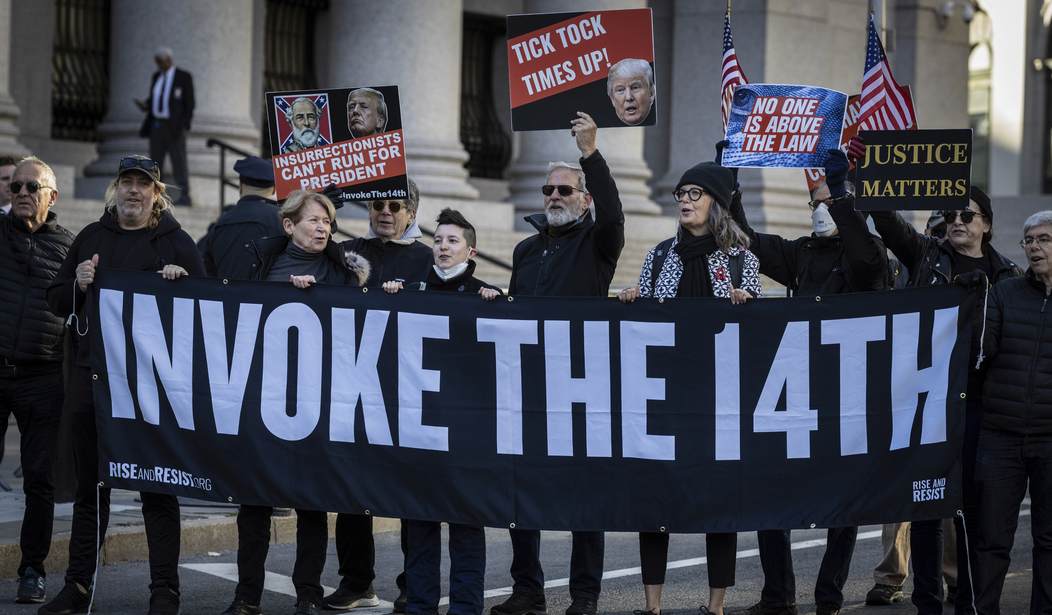Well, well, well. The US Supreme Court has remained mightily quiet in the days since the Colorado state supreme court ruled Donald Trump ineligible for the presidency via the 14th Amendment disqualification for “insurrection.” Almost everyone expects them to determine the legitimacy of a civil judicial finding of insurrection, but thus far have done nothing to indicate they will even take up the question.
Michigan’s state supreme court may force them into action. Today, the court rejected appeals by plaintiffs to get a civil trial to determine Trump’s status, sticking with the lower court’s ruling that this poses a “political question” rather than a legal question in the absence of a conviction:
With these dueling decisions, the expected appeals to the US Supreme Court become even more critical, especially as the nation races toward the start of the 2024 primaries. Unlike in Colorado, the Michigan lawsuit never reached a trial and was dismissed early on in the process. An intermediate appeals court upheld the decision to toss the case.
The Michigan Court of Claims judge who first got the case said state law doesn’t give election officials any leeway to police the eligibility of presidential primary candidates. He also said the case raised a political question that shouldn’t be decided in the courts.
His decision was upheld by the Michigan Court of Appeals, which said: “At the moment, the only event about to occur is the presidential primary election. But as explained, whether Trump is disqualified is irrelevant to his placement on that particular ballot.”
Not only did Michigan courts fail to find Trump civilly guilty of insurrection — more on that point in a moment — but they ruled the entire question legally irrelevant. Without a conviction on federal charges of insurrection (or anything else at the moment), Trump’s responsibility for the January 6 riot and what it may or may not be are questions for the voters, not the courts. The use of lawsuits to pursue a civil disqualification is entirely inappropriate … at least in Michigan.
Ilya Somin argued otherwise at Reason yesterday. Somin claimed that Section 3 does not require a conviction in a criminal trial, and that states can determine disqualification on a civil basis without it. Somin used the OJ Simpson case as his model:
A standard element of our legal system is that the same events often give rise to both civil and criminal liability. For example, a person who commits rape, murder, or assault is subject to criminal penalties, and also to civil suits by his or her victims. In such cases, a criminal conviction is not a prerequisite to civil liability. Indeed, even an actual acquittal on criminal charges doesn’t necessarily preclude civil lawsuits against the perpetrator. Just ask O.J. Simpson, who was famously acquitted of criminal charges in the murder of his ex-wife Nicole Brown Simpson, and Ron Goldman, but later lost a civil case filed by the victims’ families. The criminal acquittal didn’t stop Simpson from incurring $33.5 million in civil liability. The criminal and civil cases were distinct, and the result of one did not determine that of the other.
The same reasoning applies to Trump. The absence of a criminal conviction for insurrection doesn’t immunize him from civil proceedings arising from his role in the January 6 attack on the Capitol. Disqualification under Section 3 is a civil issue, not a criminal one. It cannot result in a prison sentence or other criminal sanctions.
This analogy fails for a few reasons. First off, families of victims have natural standing to seek damages in wrongful-death lawsuits — and monetary damages are the only penalty that courts can impose. A court cannot impose a sanction that curtails constitutional rights on the basis of such a lawsuit; the court could not, for instance, rule Simpson ineligible for public office. That requires a finding of criminal guilt, and the Constitution requires a jury trial conducted in the proper jurisdiction for that purpose.
Colorado didn’t allow for a criminal trial on insurrection charges, and for good reason: it doesn’t have jurisdiction. Insurrection is a federal crime, so state prosecutors can’t bring an indictment for it in Colorado’s courts. Furthermore, the events in which the alleged insurrection occurred took place 2,000 miles outside of Colorado’s jurisdiction.
Besides, Section 3 is only part of the issue. Section 5 of the 14th Amendment grants Congress the “power to enforce” Section 3, not the states, and requires Congress to do so “by appropriate legislation.” Congress eventually acted in that regard by passing a criminal statute prohibiting “rebellion or insurrection” in 18 USC 2383, as I pointed out in my brief rebuttal to Somin in our Headlines yesterday. Congress has not enacted a statute granting a civil tort of insurrection, and even if they did, that would have to be argued in federal court.
Former deputy special counsel Sol Wisenberg made that clear in an interview with Kayleigh McEnany last night:
It’s not clear yet whether the Trump legal team has yet filed an appeal request at the Supreme Court, but one would assume that has been done a week later. There is a hard deadline of January 4 for the ballot printing to get this question resolved, and time is running short. With Michigan contradicting Colorado, we now have a situation where a national primary election is becoming chaotic in the lack of a clear ruling on whether states have any authority to determine Section 3 disqualification at all, let alone through civil rather than criminal proceedings.
Bet on a move in the next 24 hours on this at SCOTUS. They may want the week off, but they’re not going to get it.







Join the conversation as a VIP Member